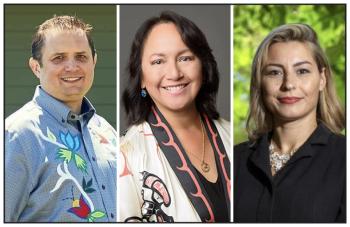Image Caption
Summary
Local Journalism Initiative Reporter
Windspeaker.com
The National Urban, Rural, Northern Indigenous Housing Coalition is a new group formed to provide ‘for Indigenous by Indigenous’ housing solutions to the national Indigenous housing crisis.
“While there absolutely is a housing crisis on many reserves,” said Biwaanag, Justin Marchand, (Métis), CEO of Ontario Aboriginal Housing Services, “one of the things that's forgotten is that over 80 per cent of Indigenous people live in urban, rural and northern areas off reserve.”
That’s 1.26 million people, and according to Statistics Canada, 18 per cent of those individuals are in core housing need.
Marchand says the new coalition has reason to believe that’s an underestimation, but even so, 18 per cent “is so much bigger than what is being allocated to address the issue,” said Marchand.
The National housing strategy was launched more than five years ago, he said. While that strategy does have investments for three distinctions-based streams for First Nations, Métis and Inuit, it only serves 20 per cent of Indigenous people.
“We need to make sure that we're including all people in that national housing strategy, because right now we are not.”
“And nowhere in that national housing strategy does it say that the government is interested in completely eliminating homelessness. So, for us, one person that's homeless is one person too many,” said Marchand.
“We have to move beyond shelters and sleeping bags and a warm bowl of soup. If we really want to end homelessness, then we have to invest in housing.”
The coalition is sending a coordinated message to the federal government that ending homelessness should be a priority.
Margaret Pfoh (Lax-Kwʼalaams) is the CEO of the Aboriginal Housing Management Association in B.C.
“In our relationship with government, we need to be partners in creating solutions for Indigenous by Indigenous. We have the lived experience. No one else has,” she said.
The goal is to create an urban, rural, and northern Indigenous housing centre by early next year, says Pfoh. “This will provide a national organizational structure to coordinate human, financial and other resources needed to deliver housing for our people.”
Katłįà Lafferty (Dene) is co-chair of the Women’s National Housing and Homelessness Network. She said “the one solution that we all must understand, and that is really hard for the government to understand, is that the solution lies within Indigenous legal principles and laws that go back to time immemorial.
“There was no such thing as a homeless person or an unsheltered person in our communities, where everyone took care of one another and it was community centered and oriented,” said Lafferty.
The coalition calls for 73,000 new, quality housing units with wrap around services.
“This aligns fairly closely with the federal government's own committee recommendations,” says Pfoh. This would mean a “$6 billion a year over the next 10 years as a minimum expectation for immediate and sustained investments.”
Lafferty hopes the coalition can eliminate money that is going directly into the hands of developers to profit from housing.
“We can no longer give money to developers who check a box that says that they're an Indigenous organization when they are not, or that they're working with Indigenous peoples, when they are not,” said Lafferty.
“Eliminate the middleman, eliminate the municipalities, eliminate the territorial and provincial governments,” says Lafferty, to have the funding go directly to non-profit indigenous organizations “to do the work that they have been set up to do. Step back and allow them to do that work successfully.”
The coalition seeks to ensure that the money is going to the people that need it the most, and to be actually building houses, not doing more research and more statistics,” says Lafferty.
“The truth is housing is a basic need, a human right, but it’s one aspect of a safe, thriving community,” said Pfoh.
The coalition is also calling for services that support people to withstand and overcome many effects of colonialism.
Without culturally appropriate and trauma-informed services, “we are plugging a hole but not fixing the problem,” Pfoh said. “However, with a strategic approach, we have specific actions to reduce inequity and create conditions for people to succeed. Who doesn’t want that?”
Lafferty wants to end discrimination, including removing stigmatizing terminologies used within the housing system.
“When they say, someone's ‘hard to house,’ that’s degrading. Where's the dignity that person deserves?”
Lafferty quotes one of her colleagues, Fran Hunt-Jinnouchi, executive director of the Vancouver Island based Aboriginal Coalition to End Homelessness. “The ‘hard to house’ should be called ‘priority one’.”
“First and foremost, we have to start from the most hurt, victimized and invisible people in our society. To allow them to feel that sense of home, with the support services that they require… just meeting them where they're at.”
Pfoh hopes this coalition helps future generations to not have others determine their success in life, to know “that they hold that power and their Indigeneity isn’t a setback but something to be proud of.”
Local Journalism Initiative Reporters are supported by a financial contribution made by the Government of Canada.

